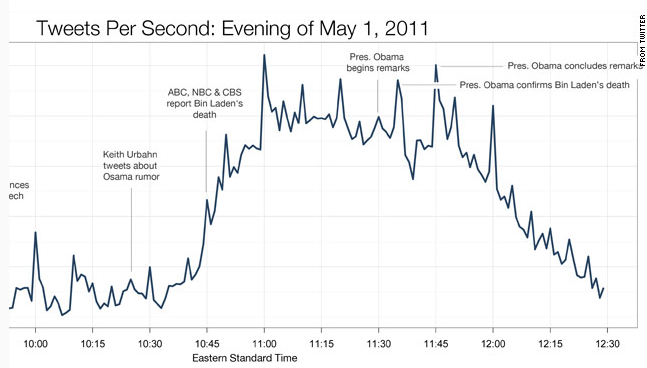Another day, another prediction of Twitter’s imminent demise today, this time from one Jason Clark.
Taking a close look at Clark’s arguments against Twitter leaves me more convinced than ever that Twitter is, like the action and community of blogging for certain thoughts and communities, The Real Thing. A New Thing. A Good Thing. A Lasting Thing.
A Real New Good Thing That Will Last.
What are Clark’s arguments?
Noting that Terminal Social Networking Solutions have come and gone over the years — BBS, Usenet, IRC — Clark concludes Twitter is “overhyped on a massive level and predict[s] its obsolescence in a year or less.”
Clark argues, correctly I think, that Twitter may soon be useless as a marketing medium, just as commercial e-mailing became self-defeating spam once too many marketers decided “share” their products via e-mail.
But most of Clark’s arguments miscast Twitter’s strengths as weaknesses.
a) Clark knocks Twitter’s simplicity, predicting that more sophisticated UIs, like Google’s Wave, will trump Twitter. In fact, Twitter hasn’t succeeded despite its simplicity, but because of its simplicity. (Check out this 1 hour and 20 minute video “intro to Wave“… whoeee!)
Twitter is a joy because it strips communication down to its essential elements — give and take, modulate and moderate, share and swap, argue and support — and make these interactions feasible with thousands of people at once. I feel my social and intellectual life is significantly richer as I share ideas, jokes, fragments of personal experience with the (currently) 465 people I follow and the 1736 people who follow me.
b) Clark kvetches that only 30% of users “stick” on Twitter. Given that Twitter depends on network effects — Twitter is not REALLY fun and socially dynamic unless your friends are also using it — this adoption rate is phenomenal for a service that’s only used by <0.2% of Americans.
c) Clark complains that Twitter’s conversations are disorganized, fundamentally crippled by “limited and obscure nomenclature.” Twitter isn’t perfect, but what is?
Twitter lets me sit in a coffee shop eaves-dropping on some of the world’s most fascinating, plugged in people — like my former editor Jon Gage, New York aficionado Amy Langfield, SEO maven Sara Holoubek, media gadfly David Carr, gossip mogul Perez Hilton, wit-whipping Baratunde Thurston, post-slinger Amanda Marcotte, conservative web guru Patrick Ruffini, social spook Amy Senger, progressive bonfire Markos Moulitsas, and Cluetrain/VRM visionary Doc Searls — and sometimes share my thoughts with them.
d) Everyone will leave for some new service with the arrival of “a glut of competition in the next few months, with companies duking it out for the best implementation of the microblogging model.”
Will all the hundreds of fascinating people I follow suddenly emigrate to one new service, dragging me a long? Social network gravity is strong — the odds are greater that the Alps will break loose from continental Europe and spiral off into space.
Twitter has already captured the best and the brightest. There MIGHT be a new Twitter-like service for an articulate, highly networked subset of people who aren’t currently enTwittered — evangelicals, for example. But there is NO WAY one million of America’s best and brightest media freaks are going to decamp en mass to some new service.
Though more powerful communications tools abound, most of the time, I don’t want to do more than what Twitter offers, thank you very much. Suggesting that Twitter will fail because of its simplicity is like saying bicycles would be more fun if they had four wheels, an eight cylinder engine, seat-belts and a glass and steel cage. We’ve got plenty of cars already, I’m happy on my bike.
My bet is that many new people will take to Twitter in the future. Twitter will be bigger and better five years from now than today. Lots won’t, but that’s OK.
(Don’t miss Ken Layne’s hilarious excoriation of Twitter in the comments on this post. Ken would be less agoraphobic if he twittered more. 🙂

